
Capture a Shanghainese alive
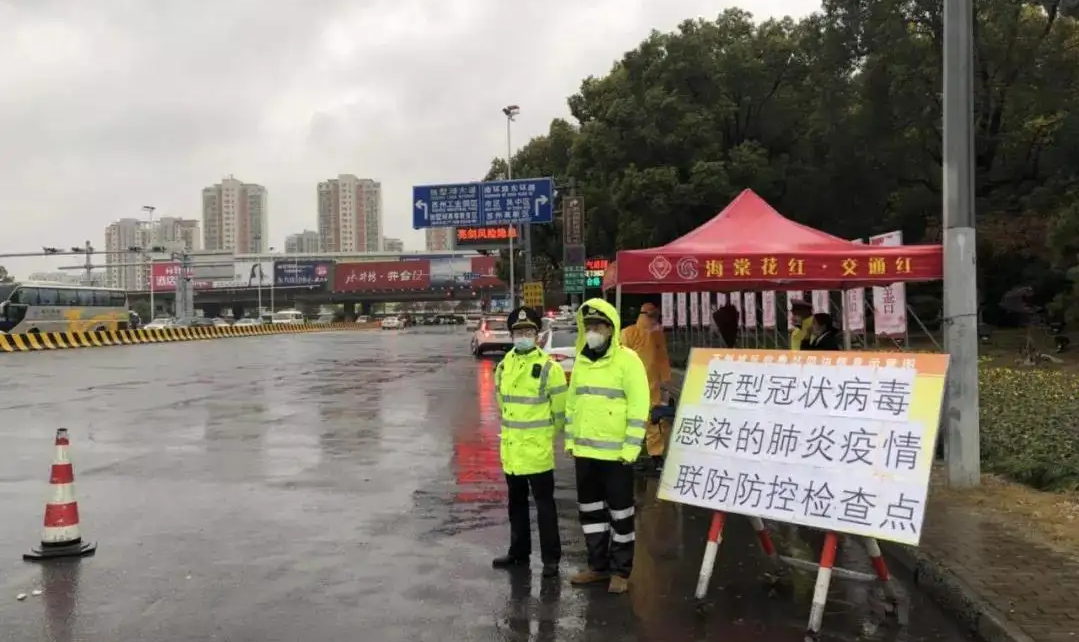
A few days ago, there was a piece of news circulating in the circle: At the expressway exits out of Shanghai, the epidemic prevention personnel have used life detectors to prevent people who escaped from Shanghai hidden in the trucks.
This has been quickly refuted, but the real crux of the problem is not here, because the information of the rumor may be false, but the social psychology behind it is true. In fact, many people may not believe it when they forward it, but more as a joke with tears in their eyes: Shanghai people have become wanted criminals.
Since April 11, as Shanghai has delineated the first batch of "three districts" with different risk levels, a new rumor has appeared on the Internet: residents in the prevention area can leave Shanghai, and many Shanghai people who have been suffocated want to To escape the city, tickets to neighboring cities are being snapped up, with neighboring Suzhou bearing the brunt.
This is actually a rumor, but an unexpected thing happened: various community groups in Suzhou actually launched the "24 yuan and 5 safety activities", which proposed to buy all the high-speed rail tickets from Shanghai to Suzhou, so that Shanghai people had no tickets to buy. This prevents Shanghainese from taking the high-speed train to Suzhou.
Think it's funny? This is already very civilized. On March 12, at the beginning of the current round of the epidemic in Shanghai, Wuxi High-tech Zone has introduced measures to publicly encourage reporting of clues to epidemic prevention and control. As long as the informant is later diagnosed as positive, an additional reward of 10,000 yuan will be given.
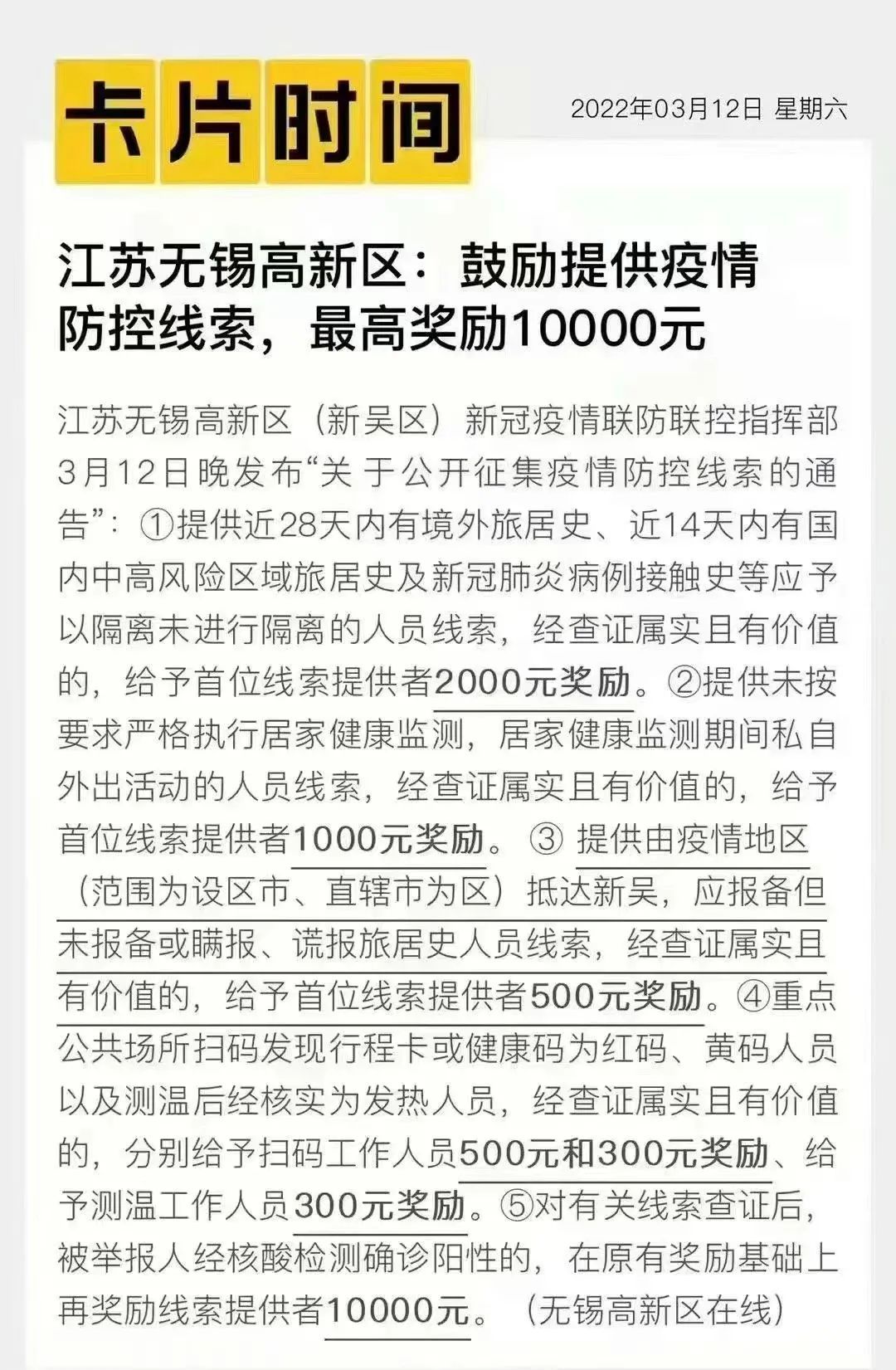
Of course, Wuxi didn’t name Shanghainese by name. Moreover, there were no high-risk areas in Shanghai at that time, and there were even very few medium-risk areas. If it were strictly defined, then Shanghai people would at least not have to worry about being caught alive in Wuxi—if they were diagnosed Positive, another matter.
In some places it's more straightforward. On the same day as Wuxi, Nantong High-tech Zone issued a notice to publicly encourage the reporting of "leads from medium and high-risk areas such as Shanghai", but the bonus was much less, only 200 yuan.
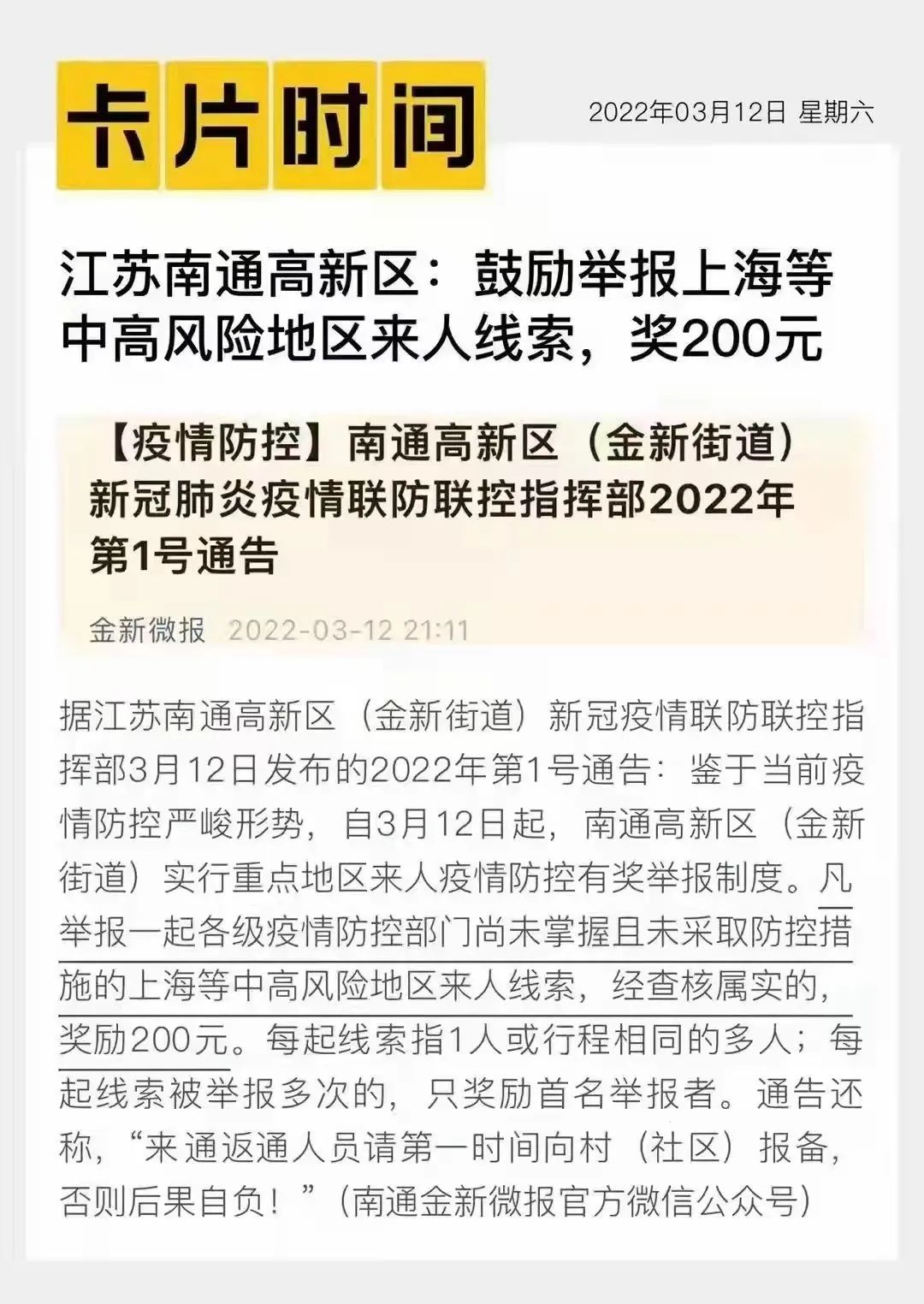
Lianshui County in northern Jiangsu is even more ferocious. On April 3, a reward report announcement was issued, without mentioning the words "medium and high risk". For visitors from other places who did not report their itinerary information, a reward of 2,000 yuan was offered for each from Shanghai. Each reward is 500 yuan, and other out-of-city areas are only worth 200 yuan.
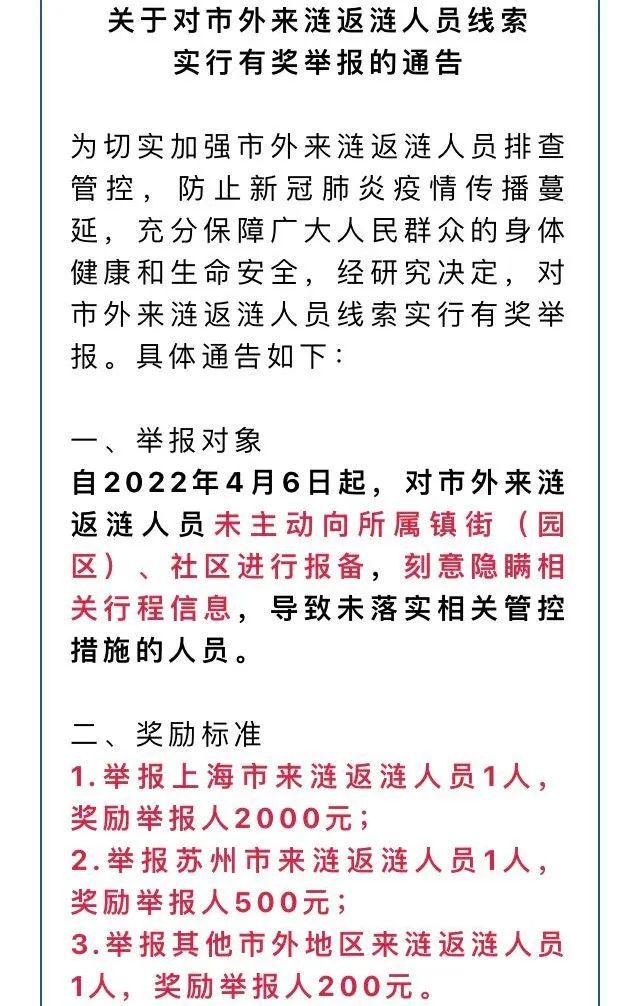
After this announcement was released on the public account "Jiangsu Urban Forum", many people protested: "Why are we Suzhou people so much cheaper than Shanghai people?" "It's actually just Kunshan, don't implicate the whole Suzhou." I don't know why, this The notice was deleted a few days later.
However, this is not a new initiative. On July 31 last year, when the Delta virus outbreak broke out in Nanjing and Yangzhou, Baoying County, Jiangsu Province, which is close to these two places, issued a reward notice, " Anyone who has a residence history in Nanjing, Yangzhou and other key areas for epidemic prevention and control in China” and has not reported it will be the object of reporting. Each clue is 50 yuan. If it can effectively prevent major risks or effectively eliminate major hidden dangers, it will be added to 1,000. Yuan.
The amount of this reward does not seem to have much to do with local finances. Some seem to be poor places, but they are also very generous. On February 19 this year, Jianghua County in Hunan Province (many people may not know where it is) decided to reward 10,000 yuan each for providing and reporting clues about Hong Kong people smuggling into Jianghua . It is worth noting that it does not only target foreign infection suspects, but also covers "Hong Kong smugglers, organizers, participants, hiders and recipients of illegal immigrants".
Of course, most places don't offer bounties like this, but they are also wary of outsiders. On the 6th of this month, hundreds of workers from the China Construction Second Bureau were dispatched by the government to help Shanghai to build a shelter. When they returned to Nanjing after completing the task package bus three days later, none of the districts agreed to accept it, and Anhui also refused entry. Only Hubei offered to take the initiative. It can be accepted (perhaps because of the special experience in Hubei two years ago), but the bus cannot directly cross the border into Hubei. In the end, Hefei accepted it, and 2 positive cases were confirmed in the landing test the next day.
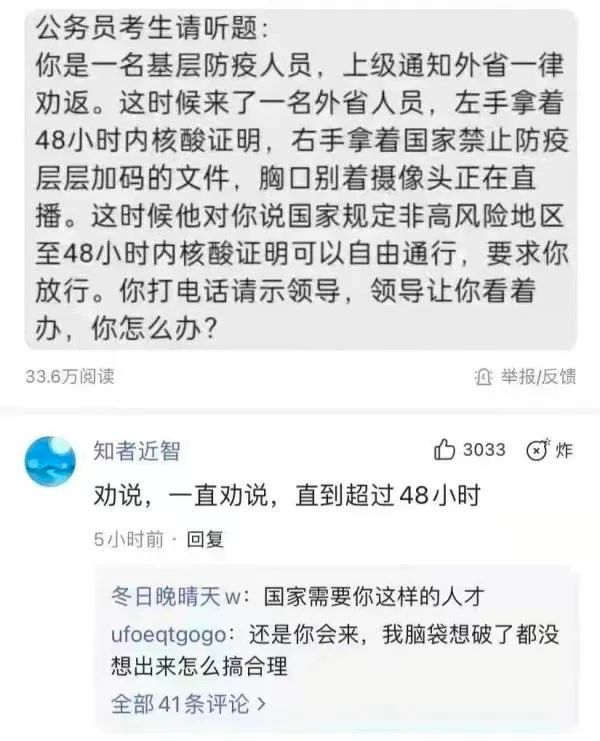
Many grassroots executives are caught in a dilemma: it is said that epidemic prevention is aimed at viruses, as long as visitors from other places are in compliance with laws and regulations and have a 48-hour nucleic acid certificate, they should accept them, but the instructions they received actually mean that it is best not to accept any visitors from other places. , those with medium and high risks are more important suspects. Because of this, some people on the Internet said that the only way is to persuade for more than 48 hours until the other party's nucleic acid certificate is invalid.
When the epidemic has fully spread, it is actually meaningless to trace the source. Like the epidemics in Shanghai and Jilin, it can only be vaguely known that they were imported from "overseas", but it seems that it is still unknown who patient No. 0 is. Because Omicron is spreading too fast, the initial cases may have already turned negative, and they have already been infected. There is no way to trace it back. Even if it is clear, epidemic prevention measures such as epidemiology and isolation are useless. Super infectious diseases like the "Spanish flu", which are estimated to have killed hundreds of millions of people, have been in the past 100 years, and it is not even clear which country it originated from.
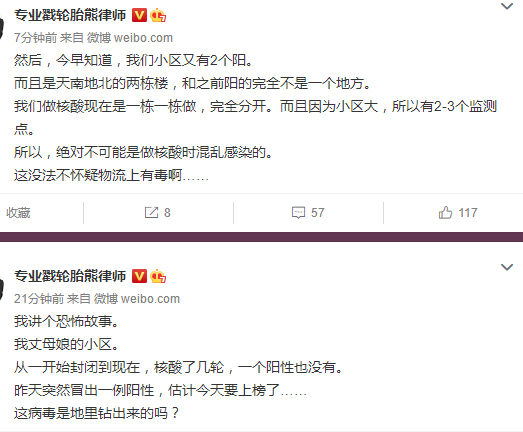
However, if you pay attention, you will find that the prevention and control logic of "foreign import prevention" in various places now carries a myth of "virus origin": it is believed that the local area is a pure land, so as long as the positive results are found in various places, the first few are from other places. Come, it is all said to be external input.
It is not only the Chinese who are like this. It can be said that this is close to human instinct. British anthropologist James Frazer said in his famous book "The Golden Bough": "People also believe that: a person returning from a trip to a foreign country may be infected with some demons from strangers. Therefore, before returning to his hometown and reuniting with relatives and friends, he needs to Perform certain sacrilege ceremonies."
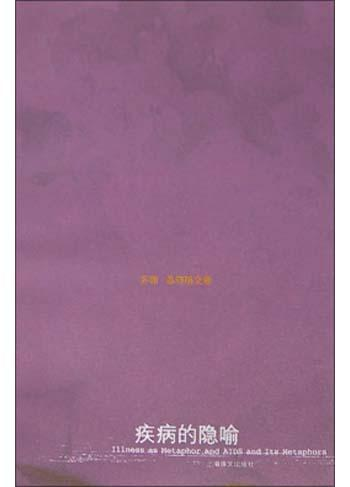
Susan Sontag also found in "Metaphors of Disease" that in the eyes of early Europeans, plagues had "foreign origins", and the object of suspicion was usually neighboring countries:
The usual description of plagues is characterized by the fact that they always come from elsewhere. When syphilis began to ravage Europe as an epidemic in the last decade of the fifteenth century, the names people gave to syphilis were examples of the need to treat those feared diseases as foreign.
Syphilis is French pox to the English, morbus Germanicus to the Parisians, Naples sickness to the Florentines, For the Japanese, it is "Chinese disease".
But such seemingly joking about the inevitability of chauvinism betrays a more important fact: there is a connection between the imagination of disease and the imagination of foreign countries. It may be hidden in the conception of evil, the anachronistic identification of evil with non-us, alien. Polluters are always evil, as Mary Douglas said. The reverse is also true: people judged to be evil are always seen, or at least likely to be, sources of pollution.
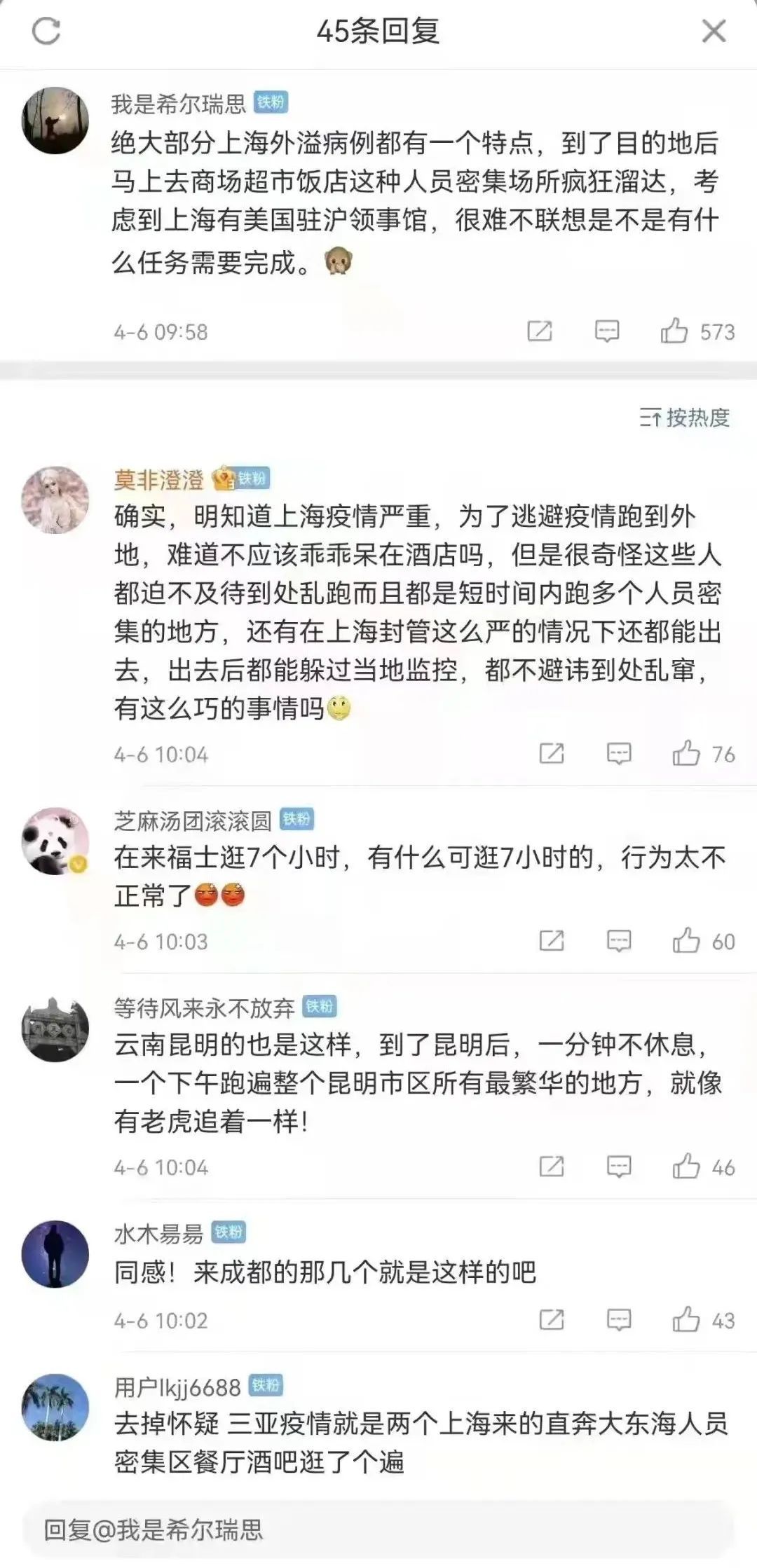
A casual look on the Internet will reveal that many Chinese people are still unable to get rid of this mindset, which has also spawned a conspiracy theory, believing that the outbreak of Shanghai's spillover is "not accidental", implying that some black hand is pushing it.
The so-called "poisoning for thousands of miles" is also inspired by this kind of psychology: the great fear of foreign viruses stimulates hysterical external imagination, and the disgust for those said to be the source areas is quickly activated - such as Shanghai overnight. From "Top Student" back to "Comprador City".
I have a feeling: Under the emergency situation of the epidemic, the instinctive reactions of various countries and regions have been stimulated. For example, the general response of East Asian societies is more inclined to close the country, while in our country, the response of many cities is like a closed Villages - During the Spanish Civil War, many remote villages heard the news that the outside world was in chaos. The first reaction was to cut off all external channels and strictly check all strangers.
A few years ago, Sonia Shah had forewarned in Epidemic Stories: "The pathogens that cause pandemics do not have the same mechanisms as wars and catastrophic storms in that they do not build trust and foster cooperative defenses. Instead, because The special psychological experience that new pathogens may bring, they are more likely to cause suspicion and distrust among humans, so that when they damage the human body, they must also destroy the social bond between people." This is what we are witnessing right now. Social Reality.
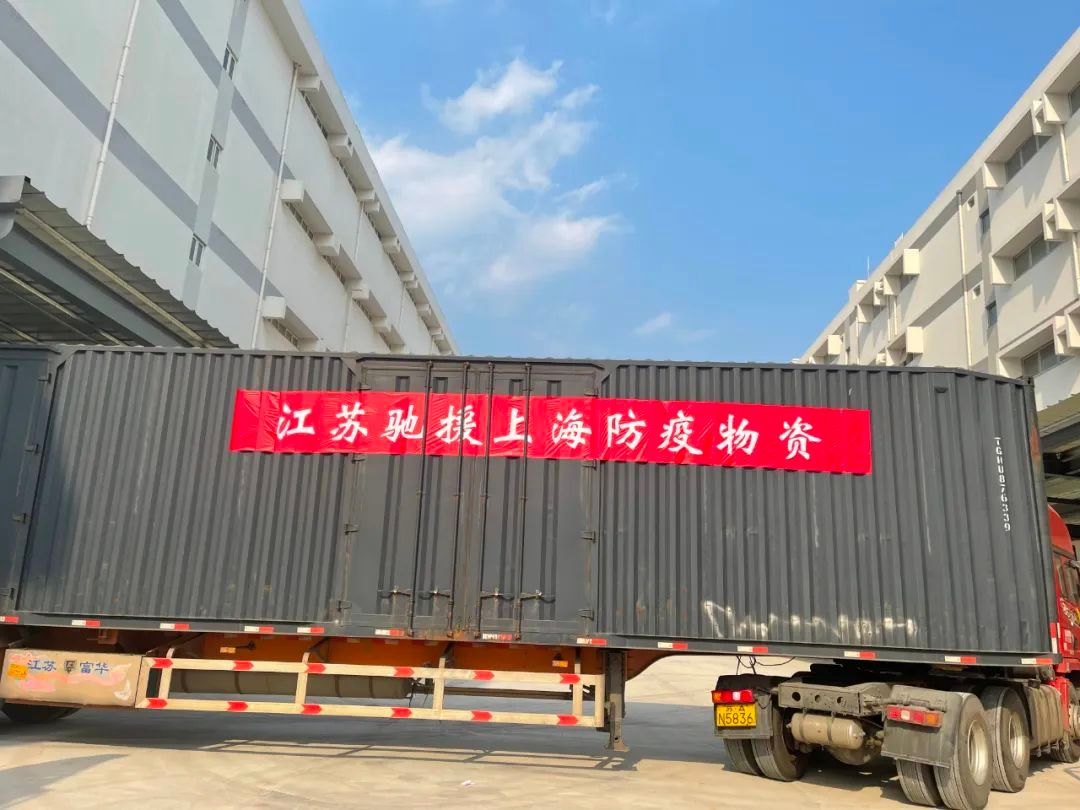
However, aren't all places helping Shanghai right now? It seems paradoxical that this kind of help is not contradictory to distrust, and if the original precautions and suspicions are not eliminated, sometimes the help even intensifies the distrust in turn.
Don't look at the fact that many places in Jiangsu are closely guarding against visitors from Shanghai this time. It is also the province that has made the greatest efforts to help Shanghai this time. As of April 6, a total of 38,000 medical staff from across the country went to Shanghai, of which 13,000 were dispatched from Jiangsu alone. , more than one third. So much so that there is a joke saying that originally only 1,000 people were required to be sent from various places, but the thirteen cities of Jiangsu, which have always been "bulk", thought that each city would have to send so many, so 13,000 people came.
Enthusiastic help and careful precaution are not contradictory. At the same time, there are many people in Jiangsu who complain that their efforts have not been rewarded: "North Jiangsu has supported a lot of vegetables in Shanghai, and Jiangsu has provided a lot of medical care to Shanghai. So far, So far, the Shanghai media has not given any public thanks, mainly complaining about the late arrival of medical care.”
The impression that "Shanghai is being treated exceptionally well" itself undermines mutual trust and empathy. Yixing, Jiangsu prepared souvenirs for the quarantined infected people in Shanghai. Some people took pictures on the Internet and ridiculed: "Are Shanghai people here for wedding wine?" Some people said that two years ago, they could shout "We are all from Hubei" , but I can't say it now because I don't feel qualified to say "We are all from Shanghai".
In a society with a differential pattern, with the addition of various layers of code, the result is like this. Of course, there are many people in Shanghai who are afraid of the positive cases around them, but Shanghai has also imported many times from other provinces before (for example, Disney was a visitor from Zhejiang), but the citizens did not scolded "foreigners poisoning thousands of miles" because it did not affect normal life. Even though this round of epidemic has suffered so much, it seems that few people in Shanghai have blamed the people of Hong Kong for this.
I know, saying this, I am afraid some people will inevitably think that this is whitewashing for Shanghai, or they are not grateful, but they are staring at the bad things in other people's homes and talking hard; but what I want to say is: isolation , doubt and fear do not allow us to feel the security and return to normal life we want, and now is the time to face that.
Like my work?
Don't forget to support or like, so I know you are with me..
Comment…